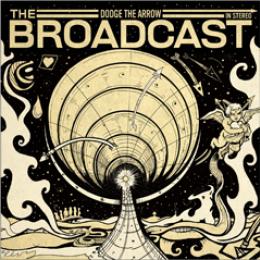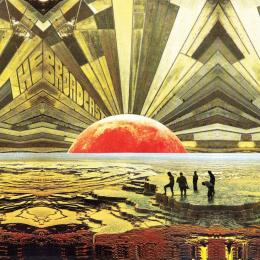Interview took place shortly after sound check on Friday 9/06/13 at the legendary Cat's Cradle in Chapel Hill, NC.The band was set to play later that evening with Toubab Krewe.
Interview by Chris Robie
Photos provided by The Broadcast/David Hawkins
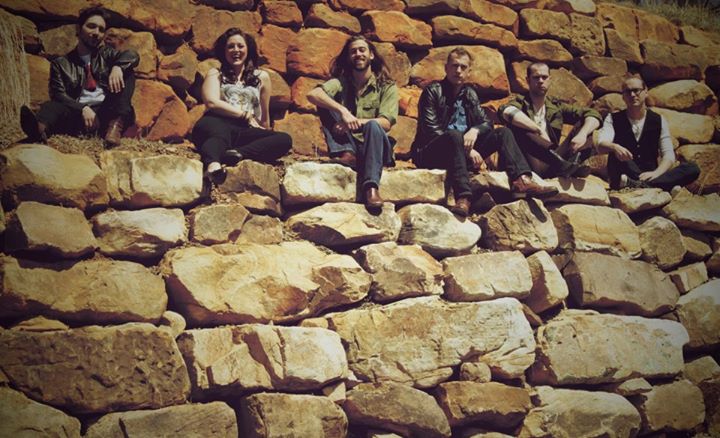
Caitlin Krisko- Vocals
Aaron Austin- Guitar
Matthew Davis- Bass
Rich Brownstein- Keys
Tyler Housholder- Percussion
Michael W. Davis- Drums
HGMN: How long have you’ve known each other and where did you all meet?
Michael: Caitlin, Rich, Tyler and I have known each other for about six years. It’s been about six years and we met in New York. It was a combination of random circumstances and different people, so the four of us have been doing this in some form for a while. And Matt, wherever he is, I’ve known him for a long time. He joined the band when we moved down to Asheville. Aaron joined about six months after we moved.
Caitlin: But we feel like the actual entity of “The Broadcast” came to exist about 2 1/2 years ago. February will be our 3 year anniversary as the lineup that we are now.
Rich: We were more or less a singer-songwriter band shortly before we moved to Asheville.
Caitlin: Yeah.
Rich: I told that to a friend of ours the other night. He was like, “I don’t know how that makes much sense. I can’t see that.”
Michael: Caitlin used to always sit down.
Rich: She used to play guitar too.
Caitlin: I wore these really long hippie dresses and was barefoot (Laughs). It takes time to discover your persona on stage, I think.
Rich: We were very different before we moved to Asheville.
Caitlin: Yeah, things really changed, especially when Matt and Aaron joined, we started playing in the south more and seeing that people were really responding to rock n’ roll. It started out by covering songs like the Rolling Stones or Led Zeppelin and then realizing that was a good wheelhouse for us. So we started writing in the spirit of that genre of music, but then still had our own influences from the earlier years to apply into the music which I think is what gives “Dodge the Arrow” its sound.
HGMN: So what inspired you guys to make music together?
Rich: A lot of happenstance, I would say.
Caitlin: Yeah, especially too in New York. I think our life style and the circle of friends that we all ran with, we all started to become friends with each other’s friends. Tyler and I met first out of all of us. I really liked his crew of friends. They were all music students, in college, so I really related to them well. So I think by becoming friends with each other’s friends and creating a life in Brooklyn together we all became really good friends, and through that just enjoying making music together.
HGMN: At that point did you know you wanted to be in a band?
Caitlin: Yeah, totally. I actually always wanted to be in a band. Funny enough, people that were sort of mentors to me in New York warned me of the challenges of being in a band. I just didn’t care. I believed that people can still do this in the industry and you can still be a band. You don’t have to be a produced, polished marketing ploy from a label. You can actually do this the grassroots way and create a life around it, which is what I wanted. I wanted a life around my music. And I wanted to create music with other people so that it was a collective experience. Everybody in this group was really down to do that so I think it worked out well.
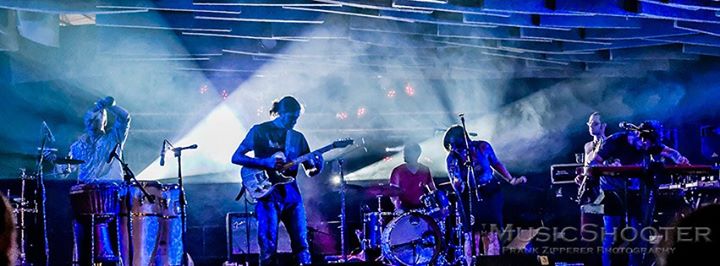
HGMN: What made you decide to make the move from New York to Asheville?
Michael: I think, number one, it was a financial thing. It’s pretty difficult to be a touring band out of New York if you’re not already making a lot of money. We all had a lot of stuff going on in terms of side jobs, side projects, just to keep ourselves afloat. And there was a lot of stuff to do. There’s a lot of stuff you can do in New York so it’s hard to focus your attention. It was a financial thing; it was an attention thing and also a location thing. Asheville is a great place to be to have access to a lot of different markets. There are a lot of different cities you can get to in a small radius. It’s cheaper to live.
Caitlin: And there’s sort of a romantic quality to it too, the idea that we could do something huge together. If we took a really big risk as a group we would see results from that.
HGMN: Did you call yourselves “The Broadcast” before you moved to Asheville?
Caitlin: We were actually “Caitlin Krisko and The Broadcast”. When we decided to move down to Asheville I had suggested that we drop my name for a few different reasons. One, I wanted to give us a sense of unity. When people would regard the band I wanted it to be a unit, a group. I didn’t ever want to be singled out. And even still with being “The Broadcast” I feel like people already single me out just being the front woman in the band. And I wanted to make sure that we were unified as much as possible from a marketing angle. That was really important to me. Also, everyone spells my name wrong all the time. So It was kind of over that too.
Tyler: Rich didn’t want us to be “Caitlin Krisko and The Afterthoughts” (Laughs).
Rich: My older brother, he was like, “How is Caitlin Krisko and The Afterthoughts?” He hit it right on the head. You know, it’s like what Caitlin said. She’s still the front person but I think amongst the band there’s definitely a sense of unity.
Michael: It was also a stylistic shift too. We’re not a singer-songwriter band anymore. We may have been more on that side of things when we were in New York but we weren’t headed in that direction nor do we want to so it doesn’t make sense for it to be “this is somebody’s band” versus “it’s everybody’s band”.
Caitlin: Yeah. So that’s why we dropped our name when we moved down to Asheville.
Michael: It was so long too.
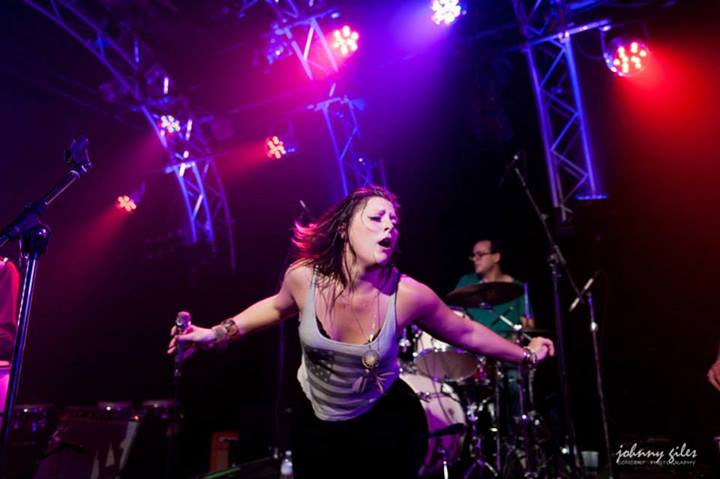 HGMN: How would you classify your music?
HGMN: How would you classify your music?
Rich: I like what we’ve been calling it, high energy rock n’ roll.
Caitlin: Ha! That is so funny. We were just talking today about how much we hate it. Honestly, If they put us on a festival lineup or something like that and made us put a genre I would say that it is female fronted rock, female fronted soul rock. I think it’s important for people to understand when they see the word rock n’ roll that there’s a woman involved because there aren’t very many women in rock n’ roll to begin with. Throughout the history of music women aren’t invited to play rock n’ roll music very often and for whatever reason have not pushed themselves into that genre of music as much as other genres. For me, as a woman, it was very important to contribute a representation of that genre to women who listen to rock music. There are so many men. I always sort of want to clarify that whenever we’re talking to people about who “The Broadcast” is.
HGMN: Did you guys know it would be this genre of music going in to it?
Caitlin: I think at one point we tried to go with a Jamiroquai sound.
HGMN: I kind of liked that sound.
Caitlin: (Laughs)
HGMN: There’s this song that you guys do…
Rich: “The Replacement”.
HGMN: Yeah! When I first heard that song I thought it sounded a lot like Jamiroquai.
Caitlin: Yeah. That was definitely us attempting to do that.
HGMN: You did it well.
Caitlin: But it didn’t feel authentic. I think that everything we have become has been really authentic in the development and it’s always been natural. In terms of setting out to write a style of music I don’t think it’s ever been like that, I think it’s been more about setting out to create a mood of music, music that makes you feel a certain way.
Rich: It’s kind of funny because people really do like that song but I think if you ask anybody in the band separately how they feel about it, it doesn’t feel like that’s who we are.
Caitlin: Yeah.
Rich: But, you know, it is fun to play.
Tyler: I think it’s interesting, we do a lot of songs that are in the classic rock wheelhouse but I think all of us are inspired by music that’s very different from that. So I think as much as we focus it towards one way it can't help but show a breath of our influences. I feel like with our music there’s always going to be some quality that’s going to be tough to describe when it comes to, “what exactly is your style?” We have a focus but every song kind of has a different vibe to it.
HGMN: So would you compare your musical style more towards classic rock?
Caitlin: Yeah.
Michael: I would say so.
Aaron: In some ways, in a lot of ways, yeah.
HGMN: So what are your songs about? Is there a certain theme about your music?
Caitlin: There’s a very wide range in topics and themes. Gosh, I would have to literally think about them song by song. Hold on, let me think about this. Good thing this is not a live interview. I’m just bombing right now. The song “The line” is sort of about the idea of being a victim of other people’s definition of who you are because when you start to define yourself through the eyes of other people it can destroy you. And then songs like “Dodge the arrow”, which I think is my favorite lyrically on the album, is sort of about an overriding sense of anxiety that I experienced in my life. I tried to capture that anxiety in images that can allow other people to understand where I’m coming from. I think lyrically I always try to think about the listener whenever I’m writing songs. And I think with being in a band and playing hundreds of shows at this point you start to get the realization that I could be playing these songs for a really long time. I have to literally be playing these songs thousands of times in the future so you have to make sure you really believe what you’re saying and what you’re saying is timeless and not of the moment. I think there’s so much that is timeless that you can talk about that maybe hasn’t been touched on yet in music. It’s about finding those topics and figuring out a way to relate those ideas to people who are listening. That creates a sense of community. I think the musicians that I love, who I’m a diehard fan of, the reason I’m a diehard fan is because the lyrical content moves me emotionally in a way that I feel like they’re my friend. And they helped me through some really emotional moments in my life. I hope to bring that to people who listen to “The Broadcast”.
HGMN: Do you draw your inspiration from personal experiences?
Caitlin: Some of its personal experiences, experiences told to me by other people. Some of it is just ideas. Some of it is reactions to things that are going on in the world right now.
HGMN: What’s bothering you the most about the world right now?
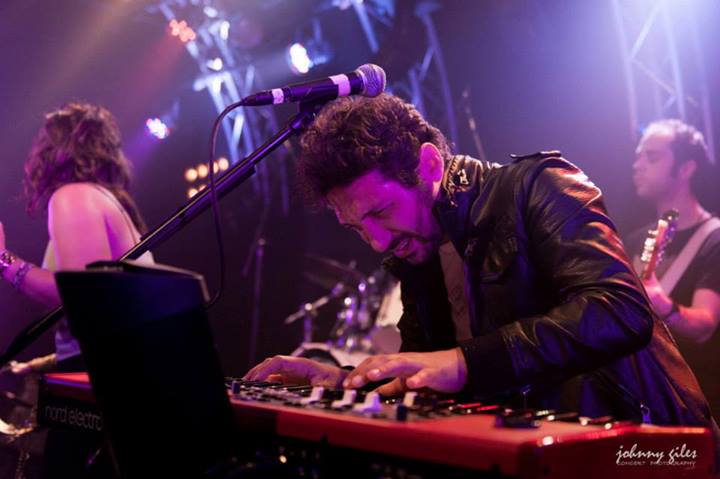
Caitlin: I think the one thing that is bothering me right now in my life is - I wish there was a larger demographic of youth that’s excited about grassroots music and touring bands, people that have given up their lives in order to tour and travel to bring their music to people who are willing to listen to it. I think my music is a community that can bring people together and can sort of use it as a platform to communicate ideas. It concerns me that certain mainstream artists can go and play in an arena and sell it out three nights in a row but if you go to the Raleigh Pour House you can go see a band that’s better than any live band you’ve ever seen and there are twenty people in the room. And I think that has to do with the responsibility of not only the bands but I think it also has to do with the responsibility of the venue owners and promoters. I think that there’s a lot of weight and responsibility placed on bands to do all of the work. Now you go to certain venues and…
HGMN: You have to find your own support act.
Caitlin: Not only do you need to find your own support acts, you need to put up posters and you need to get a street team to promote for you and you need at least this many people to show up at the venue…if you don’t do that the venue is going to be empty. It’s not like that at every venue. There are venues that do it right. They know how to run a business and they know how to run a music community. I hope to find through doing this with “The Broadcast” and through continuously playing shows and building a fan base the tried and true way, that we can inspire people to expand the music community amongst their friends. And to get the music community back to what it was twenty or thirty years ago.
HGMN: What’s been your biggest challenge as a band?
Michael: There are lots of challenges. There are day to day challenges and there are longer, bigger picture challenges. The bigger picture challenge is having a strong following in 25 different cities and bringing those crowds out when the pressure’s on. A small challenge, like your car breaking down or paying for gas to get somewhere. Every day there’s small battles and larger battles. The biggest challenge is that it just takes time and to keep everybody going, to keep us afloat financially and also mentally and physically and emotionally and all of that. That’s the challenge of being in a band, keeping those things in check. And then you got the little things like how are we going to get alcohol tonight.
(Laughter)
Caitlin: It’s true. You can look at these bands that have been around for ten years, twelve years and you start to have this amazing, deep respect for them, regardless of the music they’re making or the genre of music they’re involved with. You start to have a deep respect for the fact that they have been able to get through all of these things for that many years and to still get up on a stage and be passionate about what they’re doing. That’s amazing. We’ve only been touring full time now for 2 ½ years. But you know, always with these types of things it’s the little bites that keep you going. You get addicted to it.
Rich: That is actually a really good point.
Caitlin: 2 ½ years ago we would have killed to be able to open for Toubab Krewe at the Cat’s Cradle. That opportunity would have never come our way 2 ½ years ago, It wouldn’t have happened. Through working, playing shows and building a reputation and building a name for ourselves, now something we wanted to do 2 ½ years ago we’re doing now. Would we have liked to do it 2 ½ years ago? Sure, but at the same time we were a completely different band back then and I’m much more excited to show what we’re doing now.
Michael: So the biggest challenge is to become patient. If we were to consolidate it down to just one thing, its patience.
Tyler: Patience, persistence and practice, the three P’s.
HGMN: How would you describe your live show visually and musically?
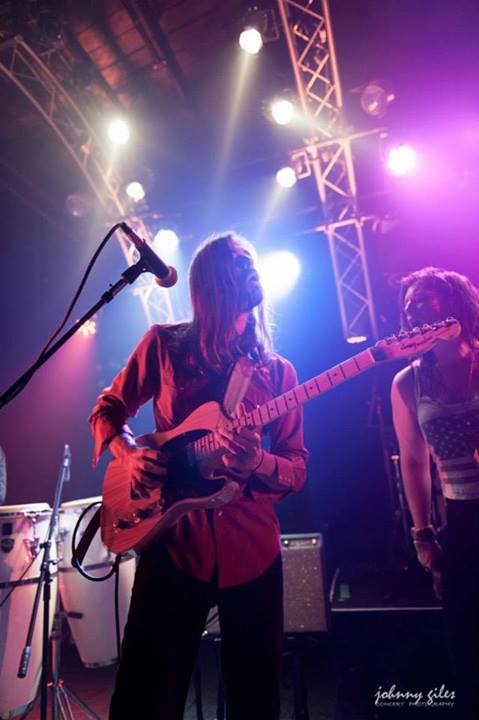 Aaron: It’s very powerful. It’s the one word I always think of when I think about our band. I think musically and visually it’s powerful. It’s something that takes over people pretty immediately and it’s sexy.
Aaron: It’s very powerful. It’s the one word I always think of when I think about our band. I think musically and visually it’s powerful. It’s something that takes over people pretty immediately and it’s sexy.
HGMN: I think that you guys have a really sexy sound on stage.
Aaron: For sure and…
Caitlin: I don’t know why that made me blush so much (laughs).
Aaron: And definitely authentic. I think the musicianship is very authentic. And I think everyone 98% of the time is performing from a real place on stage.
Caitlin: (Laughs) I mean if we’re being really honest, some of the time maybe not…due to illness.
Aaron: We go out there and we leave it out there on the stage almost every time we play.
HGMN: Let’s talk about the new album “Dodge the Arrow”. How long did it take you to make?
Caitlin: We road tested these songs for a good while before we actually went in to the recording studio. The recording session was 14 days.
Michael: long days.
Caitlin: It was 14 twelve hour days.
Michael: At least.
Caitlin: And there was also pre-production. I think it was 4 days of pre-production. We really knew going in to do this album that we needed a very specific experience in order for the album to be sonically what it ended up becoming. We knew that we wanted to record at the recording studio of choice, Echo Mountain. We wanted to have a producer on the album because we needed an outside ear and somebody that wasn’t so close to the music that they could hear other ideas to lift the sound even more. We wanted to work with the producer we wanted to work with and that worked out for us. We worked with Eric Sarafin, who was known as “Mixer Man” for a while. We flew him out from LA to do the record with us. And post- production was about 2 or 3 months, back and forth sending tracks, mixing, making alterations. We’ve got a gospel choir on one of the tracks that he hired from Los Angeles. So there was a lot of post-production work. So all in all it took about 4- 5 months to make the album.
Michael: In terms of tracking, the music making, the whole meat and potatoes of it was really an intense two weeks.
Caitlin: It was awesome, though! It was a wonderful experience. No matter what happens in my life nobody can ever take that experience away from me.
HGMN: Is this your first studio album?
Caitlin: As this band, yeah. This is the first piece of material I’ve ever had and felt like it was representational of what is going on right now.
HGMN: Who did the album artwork?
Caitlin: Joshua Marc Levy.
Rich: I was actually at his house the other day. He’s done full campaigns for AC/DC, Modest Mouse…
Caitlin: The Black Crowes.
Rich: The list goes on. We wanted it to be modeled after this Black Crowes record.
Caitlin: Not really, no.
(Laughter)
Caitlin: Don’t say that. You have to be careful with what you say in interviews. It was the esthetic of what the album cover was. It wasn’t us “modeling” our album cover after it.
Rich: That’s what I meant.
Caitlin: Well, that’s not what you said.
Rich: We wanted it to be the exact same cover as The Black Crowes.
(Laughter)
Caitlin: We wanted to work with Josh because I saw his artwork in a gallery in Asheville and I loved it. It had a very 60’s, very sort of pop art…
HGMN: Like the old Fillmore posters?
Caitlin: Very much that style of artwork. I loved it. I contacted him and low and behold he lived in Asheville and he’s from Brooklyn. So I went over to his house and we had a really great meeting, told him all about the band and gave him a bunch of music. He showed me a bunch of artwork. He’s extraordinarily talented. He’s got so many different styles that he works in and originally I wanted this Fillmore style, 60’s tour poster festival thing but then he showed me an album cover that the Black Crowes did for “Warpaint”. It was muted and it was almost hand drawn looking. There was something about it; I felt it really resonated with the whole group. So then we kind of went in a different direction. I said let’s just do something landscape. Let’s do something that’s like a different world. I want people to be able to sit down and look at it for 20 minutes while they’re listening to the album, to have enough for them to be visually stimulated.
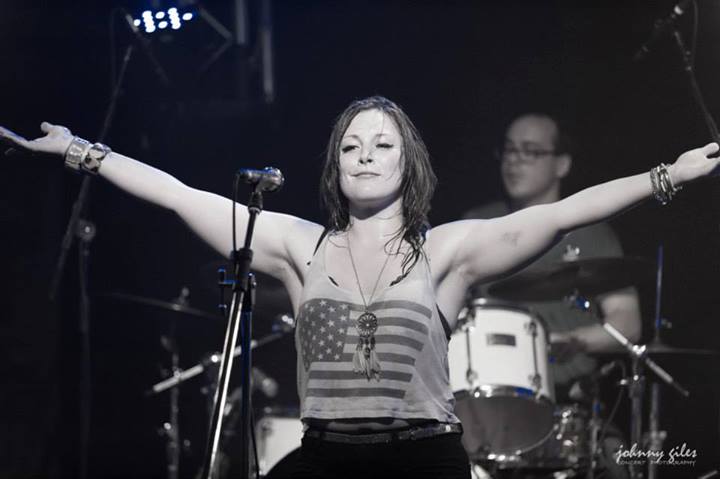
Upcoming Tour Dates
Sep 27 - Grey Eagle - Asheville, NC
Oct 10 - 622 North - Blacksburg, VA
Oct 11 - 620 State - Bristol, TN
Oct 12 - The Garage - Winston-Salem, NC
Oct 19 - The Pour House Music Hall - Raleigh, NC
Oct 20 - Carolina Balloon fest - Statesville, NC
Oct 24 - Preservation Pub - Knoxville, TN
Oct 26 - The Evening Muse - Charlotte, NC
Oct 31 - 622 North - Blacksburg, VA
Nov 01 - Legendary Dobbs - Philadelphia, PA
Nov 02 - Rockwood Music Hall - New York, NY
Nov 06 - Church of Boston - Boston, MA
Nov 08 - MInglewood Tavern - Gloucester, MA
Nov 09 - The Spot Underground - Providence, RI
Nov 22 - The Basement - Nashville, TN
Nov 23 - The Pour House - Charleston, SC
Dec 06 - Gottrocks - Greenville, SC
Dec 07 - Boone Saloon - Boone, NC
Discography
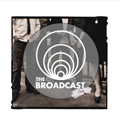
The Broadcast Live (2012)
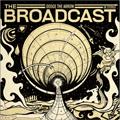
Dodge The Arrow (2013)
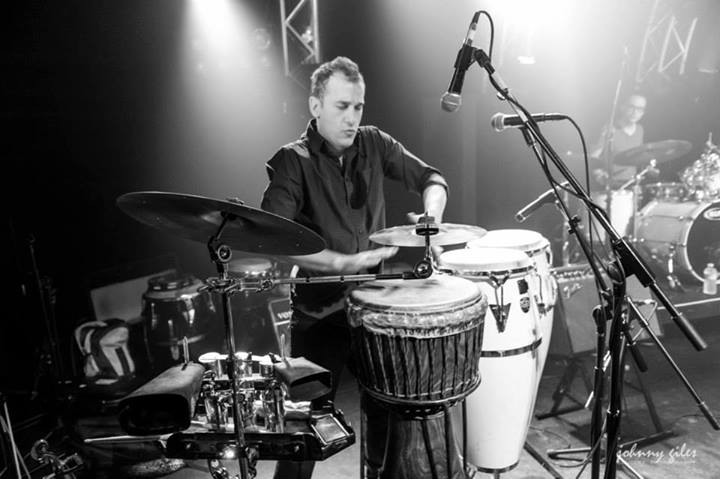
WEBSITE FACEBOOK TWITTER VIDEO



